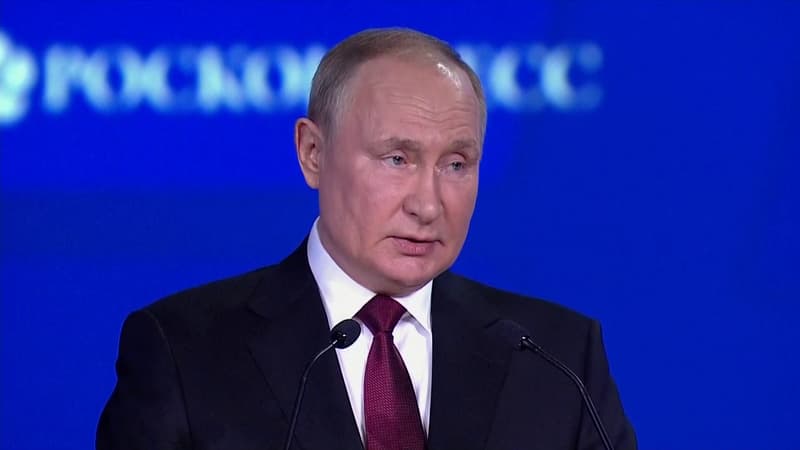“It’s not a bluff.” During his address to the Russian nation on Wednesday, the President of the Russian Federation, Vladimir Putin, said that he was ready to use against the West “all means” in his arsenal, including nuclear ones “if ever Russia’s national interests are threatened.” .”
“Those who blackmail nuclear weapons must know that this blackmail can be counterproductive. Russian citizens must know that our territorial integrity, our freedom, our sovereignty will be defended by all necessary means,” he said, shortly after ordering a partial mobilization in his country.
“It’s a rushed race”
A few hours later, Ukraine’s President Volodymyr Zelensky said he “didn’t believe” these thinly veiled threats. He is not the only one to denounce the great bluff of the Kremlin leader, increasingly criticized on Russian soil. For Sylvie Bornmann, diplomacy consultant for BFMTV, former French ambassador to Russia, Vladimir Putin seeks above all to “intimidate and dissuade us from continuing to send weapons to Ukraine.”
“I don’t think he will resort to nuclear weapons, it’s a headlong rush. He says that there is nuclear blackmail by NATO, but he is the first one who got it. Spoken. The whole speech, the responsibility is reversed. It is addressed to Westerners, but much to the Russians,” he adds.
Invited to the set of BFMTV, Aline Le Bail-Kremer, co-founder of the “Stand with Ukraine” collective, recalls for her part that Vladimir Putin “has been doing this for 20 years” when he is “in difficulty”.
“He only has that as a weapon, he’s on military difficulty and the Ukraine will win. When he’s on difficulty he can walk on a bear, wear judo gear to impress the crowd, he’s got nothing but that to do.” threaten to bomb and destroy,” he says.
What nuclear weapons?
However, the United States has declared for its part to “take seriously” Russia’s threats, announcing “serious consequences” if the Russian president takes action. In reality, it may not be a nuclear attack against Western forces, but the use of tactical nuclear weapons in certain areas, as Moscow announced several months ago.
“Russian doctrine provides for the use of tactical nuclear weapons. These types of weapons can be used against Ukrainian forces to try to cause panic, ”says BFMTV General Jérôme Pellistrandi.
“You can use them anywhere on the plains of Ukraine to amaze the world and the Ukrainian army,” summarizes Anthony Bellanger, still on our antenna.
In addition to the atomic threat, the latter also evokes “other possibilities such as the mega-bombs that the Russians have, weighing several tons, which can destroy entire neighborhoods.” “An intermediary that allows us to test the reaction of Ukrainians and Westerners,” he adds.
Last May, Russia had already threatened to use tactical nuclear weapons, Moscow before simulating “electronic launches” of nuclear-capable mobile ballistic missile systems. Since then, the CIA had deactivated the case, assuring that it had no evidence of the use of this type of weapon by Moscow, which had also ignored this threat.
Change of Russian doctrine?
However, there is a difference between Vladimir Putin’s latest threat and those he has made earlier in the conflict. “It is difficult to ignore it completely because it is not the first time that the Russians have made this threat and because Putin is changing the parameters of the situations in which Russia could use it,” explains, with BFMTV, Marie Dumoulin, former diplomat and director of the Program. Enlarged Europe.
“If the vital interests of Russia are threatened, they will resort to it, it is the Russian nuclear doctrine, in this last speech it becomes an attack on territorial integrity, which expands the field of possibilities,” he adds.
An expansion of the Russian territory favored by annexation referendums organized the days to come in certain Ukrainian areas.
Another factor to take into account as well, the “tough” character that Vladimir Putin seems to show in these latest outings. “His rhetoric is bellicose, aggressive and totally irrelevant to what the West and NATO are going to respond to,” says Colonel Peer De Jong, vice president of the Themis Institute, whose themes are linked to peace and security.
“We know that he is ready to go to the sacrifice, obviously the Russians will not back down, it is a parameter that we have to take into account, there will be no backing down, historic defeat for Russia, he will go to the end if he thinks he can lose.
Once again, dialogue seems difficult, as many heads of state, including Emmanuel Macron, have taken turns at the United Nations podium in recent hours, calling for dialogue. “Putin does not take this week the opportunity to find emergency solutions. He is a bit of the bad student in the class, the scoundrel who actually puts a coin in the machine”, concludes Peer De Jong.
Source: BFM TV


